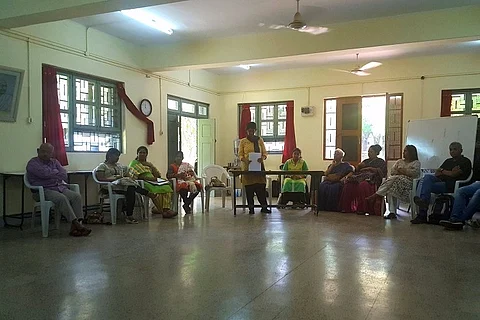

On a cloudy Friday morning, the common lounge at the Ecumenical Christian Centre in Whitefield, Bengaluru was occupied by 28-odd people who had gathered from different parts of the country. They shared one common interest, i.e. education.
All of them listened with rapt attention as Nivedita Ram, one of the speakers, explained the ancient system of education that existed in India.
Villages had smaller institutions of learning such as paathashalas and madarsas that were funded by the community and were attended by children from all sections of society, she said.
These schools imparted vocational training to its pupils and engaged in critical analysis, introspection and hands-on learning, unlike the rote learning and marks driven system followed today.
After the British invaded India, this system would fall and the purpose of education would change. Thus began the rigid formal education system more than 200 years ago.
This session was part of a three-day conference that was called to start preparations for the International Democratic Education Conference and Asia Pacific Democratic Education Conference, both of which will be held in India in 2018.
.jpeg?w=640&auto=format%2Ccompress)
Democratic Education views students as active participants in the process of their learning. It takes into account their views, treats each pupil as an individual who has their own skills and interests, and allows them to follow the path they want to pursue.
"How do we become a true democracy unless we experience democracy? Children have to experience democracy. Our idea of schooling has to be thought through. We aren't able to see beyond children sitting in rows in classrooms. Why do we want to treat all of them as the same? It is artificial, it is contrived," said Amukta Mahapatra, Convener of the conference.
So what does a democratic classroom look like?
"One where children are free to move around. They can go out, sit wherever they want. And you don't see the teacher all the time around them. There will be authority but it won't be authoritarian. And of course there has to be respect. The teacher will be there to guide, but is not the centre of the learning process. The children are. They can work individually or in small groups. There is no one way of sitting. The children cannot be viewed as consumers, an empty pot that the teacher has to fill," she stated.
Countries such as Israel and Japan already have schools following this practice and Amukta said it is time India too actively embraces the movement.
"And this is not very difficult to achieve because India has always been quite democratic in its fabric. So many cultures have thrived here because people were intrinsically democratic, they believed and accepted differences. We just have to recognise it, identify it, enhance it and widen it. That is the purpose of this conference," she said.
.jpeg?w=640&auto=format%2Ccompress)
Most participants who shared their views on the issue felt that the current education system robbed children of the ability to discuss and analyse at the very start of their learning journeys.
"The definition of literacy and education itself is flawed," said one participant. "If a fisherman's son knows his father's occupation, but does not have a certificate from an institution, he is considered illiterate. Yes reading and writing is essential but you cannot undermine what a person already knows."
Amukta, who currently trains teachers, worked for several years in the education sector in Tamil Nadu. She said that the state government has already implemented several student friendly rules for Class 1-4 children, such as allowing them to learn at their own pace.
At a residential school where she used to worked, students were involved in the process of framing ground rules. Such small changes can make a huge impact in the future.
The campaign aims to work with the government, parents, students and NGOs on how democratic education can be involved and incorporated in the current system.
"We have been stuck in what we call the traditional system of education for the last 200 years and we are not able to come out of it. But our civilisation has been around for thousands of years and we had education and learning happening all the time. So why are we stuck on this current system?" Amukta asked.